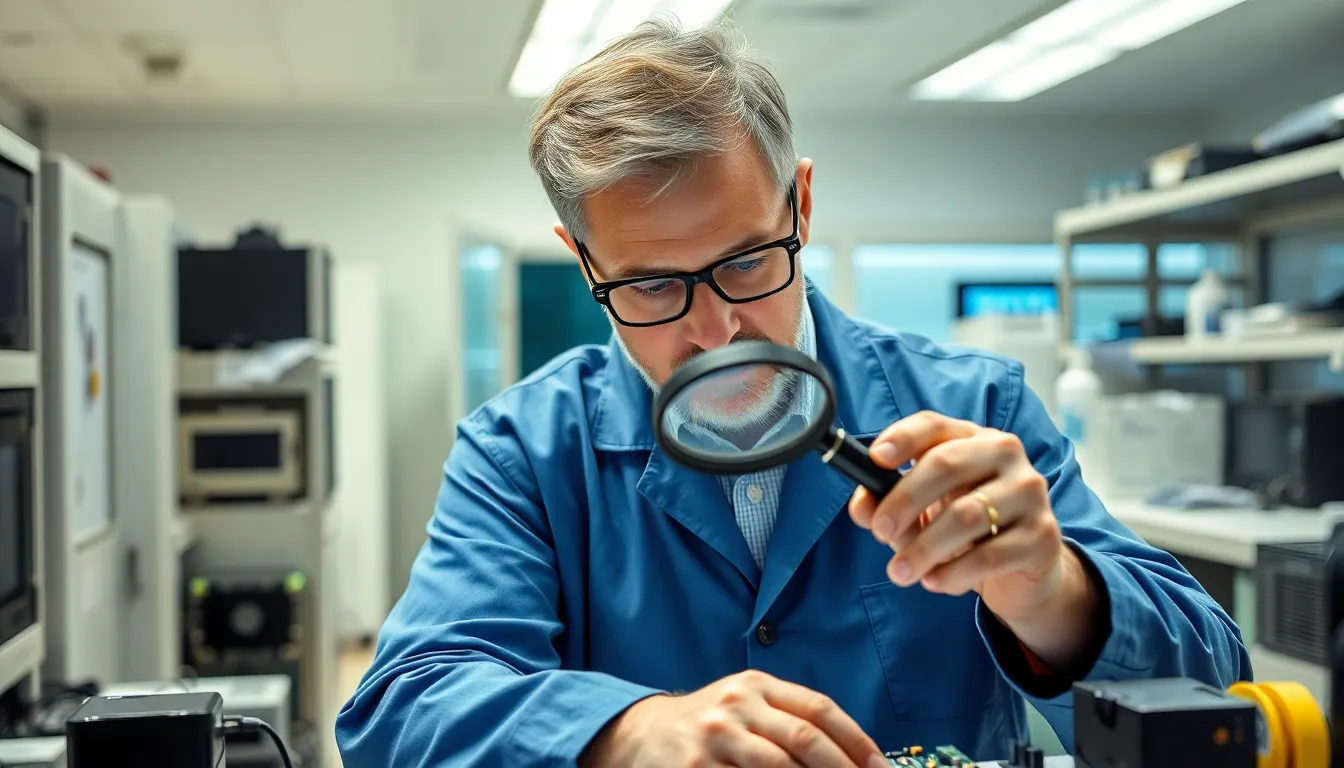Table of Contents
ToggleEver wondered who’s behind the magic that makes your computer tick? Meet the computer hardware engineer, the unsung hero of the tech world. These wizards design, build, and maintain the physical components that keep our devices running smoothly. From motherboards to processors, they’re the reason your laptop doesn’t spontaneously combust during a Netflix binge.
Overview of Computer Hardware Engineering
Computer hardware engineering focuses on the design and development of computer systems and components. This field encompasses various tasks, including creating and testing circuit boards, processors, and memory devices. Engineers in this domain often collaborate with software developers to ensure hardware and software compatibility.
Designing computer components requires knowledge of electrical engineering and computer science principles. Engineers analyze performance, identify and address potential issues, and implement improvements to enhance efficiency. They also stay updated on technological advances to integrate new features into existing systems.
Development stages include prototyping and testing. Prototyping allows engineers to create functional models of their designs, enabling them to identify flaws before mass production. Testing evaluates durability, performance, and safety standards, ensuring components meet industry requirements.
Professionals contribute significantly to various industries, including telecommunications, electronics, and aerospace. A solid understanding of modern technologies, like cloud computing and IoT, enhances their expertise and marketability. Many engineers hold at least a bachelor’s degree in computer engineering or a related field.
Career opportunities in this sector are expanding. Technical skills, problem-solving abilities, and project management expertise are critical for success. Emerging technologies create new roles, making the demand for computer hardware engineers robust. This growth continues to drive innovation within the tech industry.
Key Responsibilities of a Computer Hardware Engineer

Computer hardware engineers focus on several core responsibilities that drive innovation in technology. Their expertise shapes the performance and efficacy of computing devices.
Design and Development
Creating schematics for circuit boards represents a key aspect of design work. Engineers utilize software tools to design various hardware components, ensuring they meet specifications. Developing prototypes allows for hands-on testing and iteration of designs. Collaboration with software developers ensures seamless interaction between hardware and software. Engineers also consider cost-effective solutions while achieving high-quality performance in their designs.
Testing and Evaluation
Conducting rigorous tests on hardware components is essential for performance validation. Engineers assess prototypes under different conditions to identify potential issues. Evaluations include stress tests, which help determine reliability and durability. Analysis and troubleshooting of any functional problems enhance the overall quality of components. Adherence to industry standards during testing ensures that hardware solutions meet safety and efficiency requirements.
Required Education and Skills
Computer hardware engineers require a solid foundation in both education and skills. A degree in a relevant field lays the groundwork for their expertise and knowledge.
Educational Background
Most positions demand at least a bachelor’s degree in computer engineering, electrical engineering, or computer science. Some employers prefer candidates with a master’s degree for advanced roles. Coursework typically covers topics such as circuit design, microprocessors, and system architecture. Additionally, hands-on labs offer practical experience, which is essential for understanding theoretical concepts. Internships provide students with opportunities to apply knowledge and gain industry exposure, connecting classroom learning with real-world applications.
Technical Skills
Foundational technical skills are critical for success in this field. Proficiency in programming languages like C, C++, and Python facilitates hardware-software interaction. Familiarity with circuit design software such as Cadence or Altium helps in creating precise schematics. Knowledge of digital and analog electronics ensures engineers can work on various hardware components. Additionally, understanding data structures and algorithms enhances problem-solving capabilities. Engineers must also be adept at using testing equipment, such as oscilloscopes and multimeters, to evaluate hardware performance.
Career Opportunities in Computer Hardware Engineering
Computer hardware engineering offers diverse career paths. Professionals can explore various roles that leverage their skills in technology and design.
Job Roles
Positions within the sector include hardware design engineer, systems engineer, and test engineer. Hardware design engineers focus on creating schematics, prototypes, and detailed plans for components. Systems engineers ensure the seamless integration of hardware and software, assessing performance and diagnosing issues. Test engineers conduct rigorous evaluations, developing tests to validate reliability and efficiency. Additionally, roles like field application engineer and project manager support client needs and oversee project lifecycles. Knowledge in programming languages like C and Python remains valuable across these job roles, enhancing problem-solving capabilities.
Industries
Computer hardware engineers find opportunities in several industries. Technology companies frequently recruit these professionals to develop cutting-edge consumer electronics, such as smartphones and laptops. The telecommunications sector relies on engineers to create hardware for network communications, including routers and switches. Aerospace firms seek skilled engineers to design components for aircraft and satellite systems. Healthcare technology companies also hire engineers to innovate medical devices, emphasizing reliability and safety. Emerging fields like artificial intelligence and the Internet of Things continue to expand career prospects, demanding advanced hardware solutions and expertise.
Computer hardware engineers are pivotal in shaping the technology landscape. Their expertise in designing and developing essential components ensures that devices function at optimal levels. With a solid educational foundation and a diverse skill set, these professionals are well-equipped to tackle the challenges of an ever-evolving industry.
As technology continues to advance, the demand for skilled hardware engineers will only grow. Their ability to innovate and adapt to new trends makes them invaluable across various sectors. By embracing emerging technologies and refining their skills, computer hardware engineers will remain at the forefront of technological progress.










